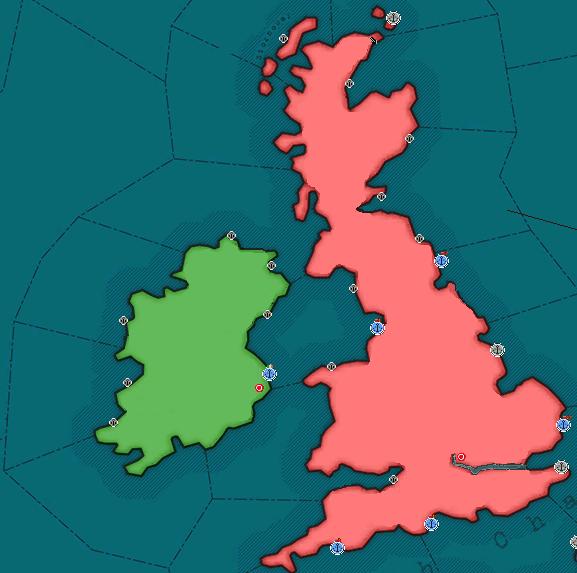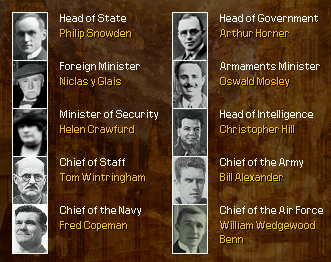Union of Britain
From Kaiserreich
(→Politics: fixed charists to chartists) |
(deleted it as it is not referenced in the game and does not work with what is actually in the game. Sarmatia also disagreed with this, it might be good to readd if this stuff is ever included in game) |
||
| Line 85: | Line 85: | ||
The Union of Britain is a "decentralised" state ruled by directly elected regional councils under the jurisdiction of a national "Congress of Trade Unions" (CTU). Major industrial concerns are nationalised and run by their respective Trade Unions with supervision from the Congress, but certain economic freedoms are afforded to local businesses such as pubs, bakeries, groceries, distribution and co-operative farms. Having seen the difficulties apparent in France's attempts at 100% nationalisation and collectivisation, the current British ethos is not one of an entirely state directed economy - instead the CTU prefers to allow low levels of economic freedom backed up by strong workers' rights, welfare support and a democratisation of the workplace in the form of co-operatives (both the Private and Public company are banned as forms of business organisation). | The Union of Britain is a "decentralised" state ruled by directly elected regional councils under the jurisdiction of a national "Congress of Trade Unions" (CTU). Major industrial concerns are nationalised and run by their respective Trade Unions with supervision from the Congress, but certain economic freedoms are afforded to local businesses such as pubs, bakeries, groceries, distribution and co-operative farms. Having seen the difficulties apparent in France's attempts at 100% nationalisation and collectivisation, the current British ethos is not one of an entirely state directed economy - instead the CTU prefers to allow low levels of economic freedom backed up by strong workers' rights, welfare support and a democratisation of the workplace in the form of co-operatives (both the Private and Public company are banned as forms of business organisation). | ||
| - | The chairman of the CTU is the nominal head of state, but the government is generally seen by British citizens as a collective entity - decisions are made by voting for a simple majority and all Unions are committed to respecting the majority ruling. Representatives are elected to the CTU by direct elections standing as nominally "independent" candidates, though in practice most coalesce in groups around certain ideals (political parties are banned as formal organisations). | + | The chairman of the CTU is the nominal head of state, but the government is generally seen by British citizens as a collective entity - decisions are made by voting for a simple majority and all Unions are committed to respecting the majority ruling. Representatives are elected to the CTU by direct elections standing as nominally "independent" candidates, though in practice most coalesce in groups around certain ideals (political parties are banned as formal organisations). |
| - | |||
| - | |||
| - | |||
| - | |||
| - | |||
| - | |||
| - | |||
| - | |||
| - | |||
| - | |||
| - | |||
| - | |||
| - | |||
| - | |||
| - | |||
| - | |||
| - | |||
== Military == | == Military == | ||
Revision as of 02:03, 30 August 2009
| ||||
| Motto Workers of the world, unite! | ||||
| Anthem The Red Flag | ||||

| ||||
|
| ||||
| Official Language | English | |||
| Capital | London | |||
| Chairman of the Congress of Trade Unions | Philip Snowden | |||
| General Secretary | Arthur Horner | |||
| Establishment - Proclaimation of the Union | October 24, 1925 | |||
| Government | Socialist federal republic | |||
| Currency | Pound sterling | |||
| Area | 209,331 km² | |||
| Population | Around 44 million | |||
Union Of Britain is a Socialist state in Western Europe. It is located on the larger of the British Isles.
Contents |
History
After the defeat of France the United Kingdom's war with Germany dragged on inconclusively for two years. In 1921 the stalemate was finally broken when Lloyd-George agreed to General Ludendorf's proposal for a "Peace with Honour". Under the terms of this treaty it was agreed that Britain would acknowledge Germany's gains from the war, whilst Germany would respect the Imperial possessions of the remaining Entente powers of Britain, Japan and Portugal. However, while Britain's overseas territories remained largely ordered and intact, the faith and support of the people in the Home Islands did not. In 1925, disaster struck: a minor labour dispute in the coalfields of South Wales quickly escalated after troops were sent in to restore order. Following the French example a General Strike was called by the TUC, and when the �government of national security� sent orders for military action to quell the unrest many troops deserted to the side of the strikers, which was accompanied by a major naval mutiny. After six weeks of rioting, looting and pamphleteering on a massive scale the Royal Family were evacuated to Canada, followed by most of the country's leading politicians and large property owners. Following the ejection of the �Establishment� a provisional government of revolutionary groups dissolved both Houses of Parliament, and declared that political authority in the new �Union of Britain� would pass to a new Congress of Trade Unions. The British people are currently secure on their island, content to build socialism in political and economic isolation, protected by the strong Republican Air Force and Navy, and with each county protected by its own popular militia who act both as a reserve military and the new police constabularies.
Following the revolution, 1926 saw the formative Congresses of Socialist Britain, with advocates of various positions coming together to hammer out the framework of the new state. What resulted was a compromise between the factions that enshrined the principals of decentralisation, co-operativism and isolationism. This resulted in the establishment of locally elected councils as the main organ of government (supervised by the national direction of the CTU), a dominant public sector, and a diplomatic stance that emphasised self-defence and national self-reliance above all else.
Politics
WIP
|
Chairman of the Congress of Trade Unions: Philip Snowden(Federationist, born 18 July 1864)
General Secretary: Arthur Horner (Federationist, born 5 April 1894)
Commissary for Foreign Affairs: Thomas Evan Nicholas (also called Niclas y Glais, Authonomist, born 6 October 1879)
Commissary for the Exchequer: Oswald Mosley (Maximist, born 16 November 1896)
Commissary for Home Department: Helen Crawfurd (Congregationalist, born 9 November 1877)
Head of the Secret Service Bureau: Christopher Hill (born 2 February 1912)
Chief of General Staff of the Republican Army: Tom Wintringham (born 15 May 1898)
Chief of Republican County Militas: Bill Alexander
Commander-in-Chief of the Republican Army: Fred Copeman (born in 1907)
Commander-in-Chief of the Republican Air Force: William Wedgwood Benn (born 10 May 1877)
The Union of Britain is a "decentralised" state ruled by directly elected regional councils under the jurisdiction of a national "Congress of Trade Unions" (CTU). Major industrial concerns are nationalised and run by their respective Trade Unions with supervision from the Congress, but certain economic freedoms are afforded to local businesses such as pubs, bakeries, groceries, distribution and co-operative farms. Having seen the difficulties apparent in France's attempts at 100% nationalisation and collectivisation, the current British ethos is not one of an entirely state directed economy - instead the CTU prefers to allow low levels of economic freedom backed up by strong workers' rights, welfare support and a democratisation of the workplace in the form of co-operatives (both the Private and Public company are banned as forms of business organisation).
The chairman of the CTU is the nominal head of state, but the government is generally seen by British citizens as a collective entity - decisions are made by voting for a simple majority and all Unions are committed to respecting the majority ruling. Representatives are elected to the CTU by direct elections standing as nominally "independent" candidates, though in practice most coalesce in groups around certain ideals (political parties are banned as formal organisations).
Military
The military doctrine of the Union of Britain puts great emphasis on naval superiority in home waters as well as providing escorts for commerce vessels which are the lifeline of the island nations. The army has a secondary role as the air force and the navy are thought to have a higher priority.
Army
The British Army is a mix of standing army units, home defense garrisons and local militias which provide a mobile reserve for the home defense garrisons. The standing army is rather small, but the manpower pool of Britain is great and a great number of divisions can be raised in a relatively short time should the need arise.
Navy
Despite the loss of many ships of the Royal Navy as the monarchists left for Canada, the Republican Navy is still one of the greatest navies of the world and one of the few navies of the world that employ aircraft carriers. The Republican Navy is the sole navy in Europe that can hope to take on the Kaiserliche Marine at sea. The Republican Navy, which is self-governing and largely self-financing, controls not only maritime defence, customs and the merchant marine, but also has a huge influence over shipbuilding, trade and foreign policy.
Air Force
The Republican Air Force is mainly tasked to defend the British airspace and not so much on fighting an aerial war in enemy skies. Still, the RAF does employ a significant number of strategic bombers under the RAF Strategic Bomber Command should the need arise to take the war to the enemy.
Foreign relations
WIP
Culture
In Britain, most of the famous authors of the twenties have been executed or forced into exile in Canada for their monarchist views. One example would be Arthur Conan Doyle who was forced to flee during the revolution, and his works remain banned. Although there are some authour for example C.S. Lewis.


